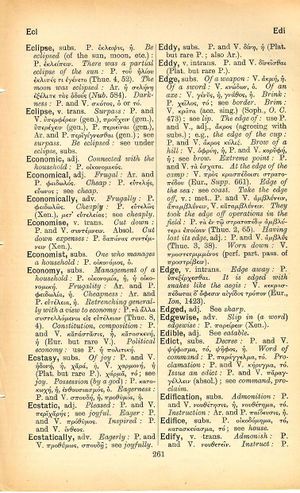edge
Κενῆς δὲ δόξης οὐδὲν ἀθλιώτερον → Nihil est inani gloria infelicius → Als leerer Ruhm jedoch ist nichts unseliger
English > Greek (Woodhouse)
substantive
of an axe: V. γένυς, ἡ, γνάθος, ἡ.
brink: P. χεῖλος, τό; see border.
brim: V. κρᾶτα (acc. sing.) (Soph., Oedipus Coloneus 473); see lip.
the edge of: use P. and V., adj., ἄκρος (agreeing with subs.); e.g., the edge of the cup: P. and V. ἄκρος κύλιξ.
brow of a hill: V. ὀφρύη, ἡ, P. and V. κορυφή, ἡ; see brow.
extreme point: P. and V. τὰ ἔσχατα.
at the edge of the camp: V. πρὸς κρασπέδοισι στρατοπέδου (Eur., Supplices 661).
edge of the sea: see coast.
take the edge off, v.: Met.. P. and V. ἀμβλύνειν, ἀπαμβλύνειν, V. καταμβλύνειν.
they took the edge off operations in the field: P. τὰ ἐν τῷ στρατοπέδῳ ἀμβλύτερα ἐποίουν (Thuc. 2, 65).
having lost its edge, adj.: P. and V. ἀμβλύς (Thuc. 3, 38).
worn down: V. προστετριμμένος (perf. part. pass. of προστρίβειν).
verb intransitive
it is edged with snakes like the aegis: V. κεκρασπέδωται δ' ὄφεσιν αἰγίδος τρόπον (Eur., Ion, 1423).

